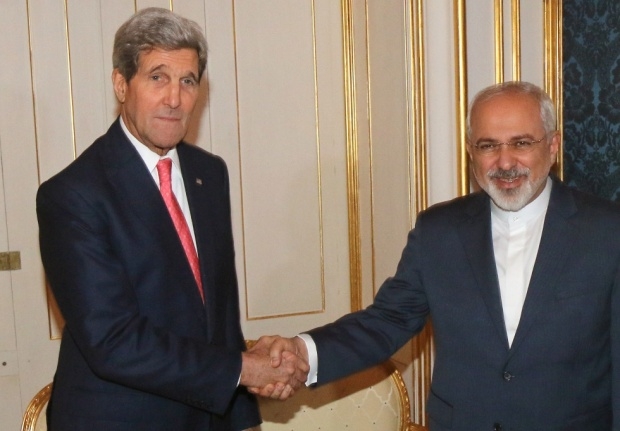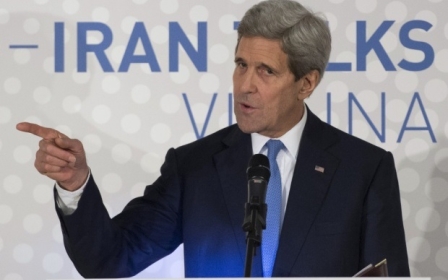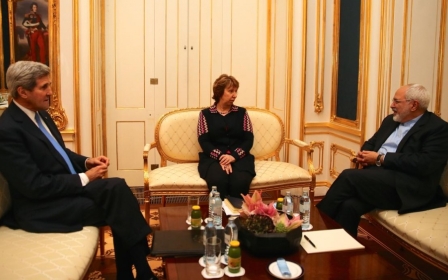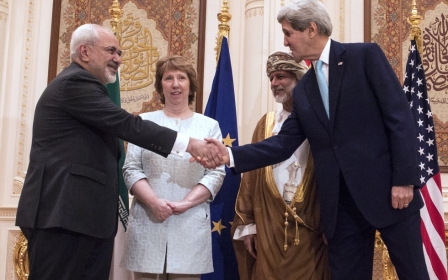US Congress sceptical of Iran nuclear talks extension

US House and Senate members reacted coolly Monday to an extension of international negotiations over Iran's nuclear program, with sceptical lawmakers demanding Congress "tighten the economic vice on Tehran" through new sanctions.
No sooner had the extension been announced in Vienna and US Secretary of State John Kerry implored US lawmakers not to "walk away" from the negotiations by slapping punitive sanctions on Iran, that several lawmakers advocated just that, setting up a potential White House clash with Congress.
"Now more than ever, it's critical that Congress enacts sanctions that give Iran's mullahs no choice but to dismantle their illicit nuclear program," Republican Senator Mark Kirk, who supports new sanctions, said in a statement.
"Congress will not give Iran more time to build a nuclear bomb."
Kirk has drawn up tough legislation with Senate Foreign Relations Committee chairman Robert Menendez, a Democrat that would see sanctions kick in should Iran violate terms of the temporary agreement or future deal.
But the Senate leadership has refused to bring it to the floor, allowing a chance for President Barack Obama's administration to pursue its negotiations.
Menendez suggested legislative action was vital to a breakthrough.
"I intend to work with my Senate colleagues in a bipartisan manner in the coming weeks to ensure that Iran comprehends that we will not ever permit it to become a threshold nuclear state," he said.
New sanctions 'counterproductive'
But Senator Tim Johnson, chairman of the Banking Committee through which sanctions legislation often passes before getting a full vote, warned that imposing new sanctions "now would be grossly counterproductive."
Hawkish Senators John McCain, Lindsey Graham and Kelly Ayotte said they supported additional sanctions as negotiations continue, and demanded "any final deal between Iran and the United States be sent to Congress for approval."
House Foreign Affairs Committee Chairman Ed Royce said Obama should support new sanctions as a way to increase leverage on Iran.
"This seven-month extension should be used to tighten the economic vice on Tehran - already suffering from falling energy prices - to force the concessions that Iran has been resisting," Royce said in a statement.
Royce was backed by panel Democrat Brad Sherman, who said new sanctions are the "best hope for a good agreement."
House Speaker John Boehner was vaguer in urging pressure on Tehran.
"Instead of giving Iran more flexibility, we should be holding this regime accountable for the threat it poses to the region," Boehner said.
Senator Bob Corker, tipped to replace Menendez as the powerful Foreign Relations chairman when Republicans take full control of Congress in January, supported a threat of new sanctions should the Iran deal ultimately fall apart.
"Congress must have the opportunity to weigh in before implementation of any final agreement and begin preparing alternatives, including tougher sanctions, should negotiations fail," Corker.
The State Department acknowledged the role of sanctions in bringing Tehran to the negotiations.
"On the other hand, sanctions are not alone going to get us the comprehensive deal," State Department spokesman Jeffrey Rathke told reporters.
US Secretary of State John Kerry insisted however that progress had been made in Austria and explained now is “not the time to get up and walk away”.
“We have made real and substantial progress – new ideas have surfaced,” he told reporters. “Today we are closer to a deal that will make the entire world […] safer and more secure.”
Kerry explained negotiators will meet again in December with the aim of striking the outline of a political deal within four months. He said if an agreement isn’t reached within that time “we will revisit how best to proceed.”
Iranian media reaction
Meanwhile, Iran's media were deeply split Tuesday on the merit of extending nuclear talks with the West, with conservative newspapers slamming the move as reformist outlets said progress had been made.
Vatan-e-Emrooz, a hardline broadsheet title, headlined its front page "Nothing" -- and beneath the fold had only empty white space.
"A year has passed since the Geneva accord. Nuclear negotiations for the removal of sanctions did not reach a result," the newspaper said, announcing the seven-month extension in talks to its readers.
"This is to cover up that negotiations in fact failed because of America's excessive demands," a downbeat front-page editorial added.
Siasate-e Rooz, another hardline title, was similarly pessimistic.
"Americans, despite announcing in their media that they want a deal, in fact do not believe in reaching a nuclear agreement with the Islamic Republic of Iran and have never taken any steps to achieve this result," its front-page editorial said.
However, President Hassan Rouhani, who on Monday said a nuclear deal with the West would be done despite missing the deadline in Vienna, received support from more moderate titles.
"A major change took place in the past 15 months... the victory of realism, rationality and pragmatism," the reformist Shargh newspaper said.
"These negotiations showed that neither is Iran 'the axis of evil' that the Americans imagined and tried to make the world believe, and nor does America have unresolvable conflicts with Iran as many said," it added.
Iran, considered the mouthpiece of Rouhani's government, said: "The result of this exciting competition was a draw. It may not have satisfied spectators, but the teams taking part expressed satisfaction with the result."
The overall tone was pessimistic, however, with most newspapers taking a sceptical view of the talks' extension.
Javan, a newspaper with close links to Iran's powerful Revolutionary Guards, headlined its front-page report: "Seven months of artificial respiration to nuclear diplomacy."
New MEE newsletter: Jerusalem Dispatch
Sign up to get the latest insights and analysis on Israel-Palestine, alongside Turkey Unpacked and other MEE newsletters
Middle East Eye delivers independent and unrivalled coverage and analysis of the Middle East, North Africa and beyond. To learn more about republishing this content and the associated fees, please fill out this form. More about MEE can be found here.




